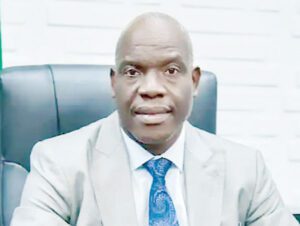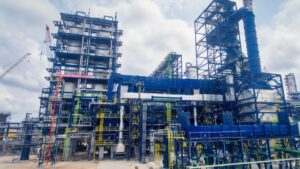
TCN is working to further expand the nation’s grid
The Transmission Company of Nigeria (TCN), a power utility positioned by the Federal Government to advance operations in the private-led power sector is no doubt living up to its mandate.
TCN is at the middle of the power sector value chain, carrying out the pivotal role of evacuating power from Generation Companies (GenCos) to the Distribution Companies (DisCos) nationwide.
Although there are calls in some quarters seeking a state of emergency in the power sector, it should be noted that TCN is implementing projects in line with its transmission expansion plan aimed at systematically expanding the grid network.
Today, a visit to TCN Work Centers and a simple monitoring of operations of TCN will reveal huge information about how the capacity of the national grid has improved under the administration of President Muhammadu Buhari, especially with the record of four all-time peak in the sector in 2020, and two recorded in January 2021, so far.
For the purpose of clarification, TCN does not distribute electricity to electricity consumers and cannot also switch off consumer feeders. Its jurisdiction on the network is from 330 kilovolt (kV) to 132kV power lines. The company cannot switch off consumers feeders as it is not within TCN’s jurisdiction.
The fact is that electricity cannot be stored; therefore, power generation, transmission and distribution occur simultaneously. What determines what is put on the grid, is what the distribution companies are ready to off-take, this equally regulates what the generator would generate, which is why the DisCos are required to nominate what they would off-take a day ahead.
It is important to note that whatever happens on the downstream network, impacts on transmission and generators. The TCN grid network has the capacity of 8,100MW even as it continues to work towards completing ongoing projects to further increase its capacity.
The National Control Centre (NCC), an arm of TCN, is responsible for ensuring grid stability and its dispatch instructions are guided by the Grid Code, which it strictly adheres to, with clear understanding of consequences to the nation’s grid.
That notwithstanding, it would be wrong to attribute most localized outages and load-shedding of consumers feeders to TCN. Discos can only off take what is generated, while Gencos can only generate what Discos can off take. Each of the 11 DisCos has its own challenges which may necessitate outage in certain places per time.
Under Abuja Region of TCN, Gwagwalade-Karu line does not exist as has been mentioned in some quarters. There is no direct link between Gwagwalada and Karu Transmission Substation.
On the Gwagwalada – Apo line however, there is a tee-off on the line which feeds Kukwaba Transmission Substation through Apo Transmission Substation. TCN does not have any problem at its Kukwaba or Apo Substation that would require cutting supply to any of Abuja DisCo feeders.
Electricity customers are connected directly on 33kV lines which TCN operators have no control over, except during extreme emergency requiring operations crew to quickly open such feeder to enable maintenance service.
At the 2x60MVA Karu Transmission Substation, all the feeders are set based on the load demand and nomination presented by AEDC on a daily basis. Journalists who may wish to undertake an on-the-spot inspection to the station, would find that none of the breakers is in bad shape.
The 20MW Feeder K4 at Karu Substation is never overloaded as insinuated in some quarters. Between the Karu Transmission Substation and the injection substation belonging to Abuja DisCo, there is a line load of over 12MW. Off-taking 12MW through an 11kV Distribution feeder for onward delivery to customers, is the responsibility of AEDC not TCN.
It is a fact that TCN has pockets of challenges as with every other participant in the value chain, but that should not translate to misinformation of the public by anyone who would rather ignore the facts.
There have been repeated vandalism of major TCN transmission lines in recent times, which TCN promptly repairs any time it occurs. While working with security agencies to help monitor the lines, it’s important to note that vandalism is a social menace, we do not have control over the cable thieves but TCN is doing all it can to combat it with the help of security agencies and staff of the TCN lines patrol department.
It would interest the public to know that between 31/10/2019 to-date, Abuja Sub-region of TCN witnessed 21 acts of vandalism on 330kV and 132kV aluminum conductors by unknown persons and on each occasion TCN has promptly replaced or repaired the lines. The extent of damage on each line determines the length of time it would take to complete repairs. Presently the system lines maintenance crew of Abuja Region are replacing 2000 metres of 350mmsq aluminum steel reinforced conductor on Gwagwalada-Westmain 330kV Double Circuit (DC) vandalized by unknown persons. To say that incidents of vandalism are mere excuses is very worrisome.
TCN hereby appeal to all to be more vigilant in assisting it in the fight against power equipment vandalism.
In Kubwa Substation, one of the 60MVA power transformers which developed fault was taken out for repairs, meanwhile, a replacement was procured late last year, and is to be delivered to the substation anytime from now. Meanwhile the second transformer in the substation is transmitting at full load (42MW), which can adequately take care of the load requirement for Kubwa axis and environs.
TCN is also implementing the Abuja ring project which is at various stages of implementation. The project which involves the addition of five (5) new substations and two major transmission lines are equally ongoing. Anyone familiar with transmission projects execution would know that the projects take between 3 to 5years or more, to complete depending on the scope of the project. This is the project that will solve transmission constraints in Abuja totally.
TCN does not buy refurbished or undersized transformers. All transformers are procured through due process approved by Bureau of Public Procurement (BPP) and transformers procured must fulfill international standards (IEC, KEMA etc), in line with procurement guidelines.
TCN in recent times has taken a more responsive approach serving the GenCos in its upstream and the DisCos in its downstream. TCN is optimizing its available resources to better serve the DisCo and Gencos through effective maintenance of the existing grid network while applying best practices in completing ongoing low hanging fruits project to improve the overall grid capacity.
This approach paid off quickly as evidenced in the multiple all-time peak generation recorded in the sector on the following days within the last six months, 5377.8MW on 1st of August 2020 at 20:30hrs, 5,420.30MW on August 19, 2020 at 19:15hrs, 5,459.50MW was achieved on the 28th of October, 2020 at 20:15hrs and two days later on the 30th of October,2020, the Nigerian Grid network recorded yet another all-time peak of 5,5020.40MW, and all these were seamlessly transmitted through the transmission grid.
The Transmission Company of Nigeria on Wednesday 6th January, 2021 and Thursday 7th January 2021 recorded yet another all-time peak of 5,552.40MW and 5,584.40MW. This is an uncommon record in the Nigerian power sector. This consistency and regular incremental improvement in Grid Performance on TCN’s part is an indication of the professionalism and best practices that was brought in by the new Management in TCN.
To better serve the 11 DisCos, TCN has entered into a Service Level Agreement (SLA) with the DisCos. To ensure proper synergy and effective service delivery via identification and execution of projects to further improve the grid and deliver quality electricity to consumers across the country.
The management of TCN reiterates its commitment towards further improving the national electricity grid as it continues to diligently implement its grid expansion programme with projects which are at various stages of implementation, from the reconductoring of the Ikeja West – Sakete transmission line, reinforcing the Ugwuaji to Apir Transmission line, among other numerous projects spread across the nation.



